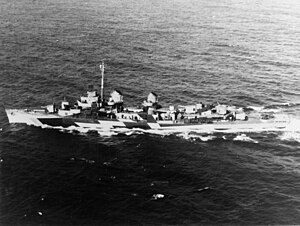USS Twiggs (DD-591)

USS Twiggs (DD-591), in camouflage paint, 23 February 1945.
|
|
| History | |
|---|---|
|
|
|
| Namesake: | Levi Twiggs |
| Builder: | Charleston Navy Yard |
| Laid down: | 20 January 1943 |
| Launched: | 7 April 1943 |
| Sponsored by: | Mrs. Roland S. Morris |
| Commissioned: | 4 November 1943 |
| Struck: | 11 July 1945 |
| Fate: | Sunk by kamikazes off Okinawa, 16 June 1945 |
| General characteristics | |
| Class and type: | Fletcher class destroyer |
| Displacement: | 2,050 tons |
| Length: | 376 ft 6 in (114.7 m) |
| Beam: | 39 ft 8 in (12.1 m) |
| Draft: | 17 ft 9 in (5.4 m) |
| Propulsion: |
|
| Speed: | 35 knots (65 km/h) |
| Range: | 6500 nmi. (12,000 km) @ 15 kt |
| Complement: | 273 |
| Armament: |
|
USS Twiggs (DD-591), a Fletcher-class destroyer, was the second ship of the United States Navy to be named for Marine Major Levi Twiggs (1793–1847).
Twiggs was laid down on 20 January 1943 at the Charleston Navy Yard; launched on 7 April 1943; sponsored by Mrs. Roland S. Morris; and commissioned on 4 November 1943, Commander John B. Fellows, Jr., in command. She was sunk on 16 June 1945 by a kamikaze aircraft near Okinawa.
Following a shakedown cruise to Bermuda in December 1943, Twiggs operated out of Norfolk as a training ship until 12 May 1944, when she departed Hampton Roads in company with Franklin (CV-13), Cushing (DD-797), and Richard P. Leary (DD-664) and proceeded, via the Panama Canal and San Diego, to Hawaii.
After arriving in Pearl Harbor on 6 June 1944, Twiggs took part in exercises and drills in Hawaiian waters and escorted convoys operating between Oahu and Eniwetok. Throughout most of July, Twiggs worked out of Eniwetok alternating exercises with escort and radar picket duties. On 19 August, she returned to Pearl Harbor to begin rehearsals for the long-awaited return to the Philippines.
...
Wikipedia
